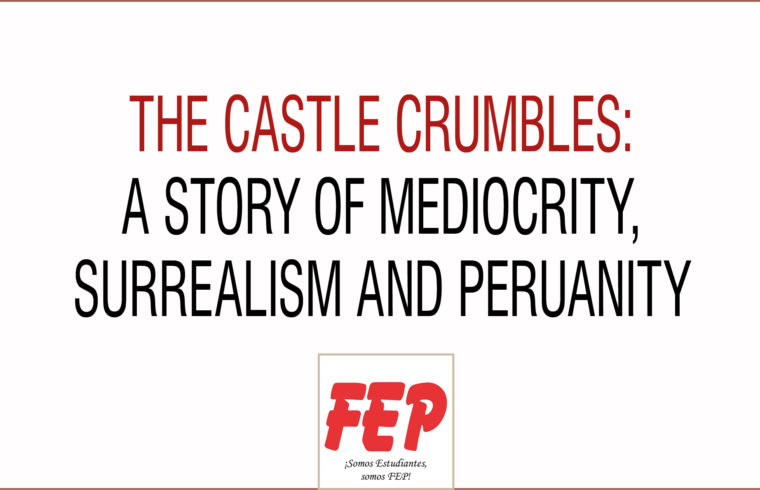Marco Jean Paul Apaza Gonzales
Sec. de Medio Ambiente OCLAE, Asesor Principal FEP – PERU
José Pedro Castillo Terrones, the man who won the general elections of the Republic of Peru and who has led the country since July 29. The man who, hidden in the Government Palace, refuses to recognize reality, and degenerates into the worst alternative for any statesman: repression.
Since the government took office there has not been a clear path, some branded it a communist regime, others a moderate government of social democracy, in the end it ended up being a government of upstarts with corruption investigations, at least in its closest circle.
As I have said in previous articles, it is a national custom to have crises and political instability. The coups d’état are as remembered as the goals of the National Soccer Team, it is part of our identity to offer the country to warlords who end up betraying everyone.
The big difference is that this time, and perhaps it won’t happen again for decades, a leftist proposal won democratically, with everything against it. With all the powers that be in opposition, which is a great message that should be interpreted by the powerful.
I win a national sentiment, discontent with the human and economic losses in the pandemic. That pain was channeled in protest, in indignation, in the desire for change, which was reflected in the polls. All this lost by the man from Sombrero Chotano who littered his land.
His mistakes, some investigated for being considered possible crimes, are so many that I cannot summarize them. In an effort of synthesis I will mention some: corruption, appointments without suitability, breach of promises, generation of impossible expectations.
I told him, we told him, when we talked with him off-camera, that it was impossible to comply with the 10% of GDP for education, that he better handle the 6% that was previously studied by the unions. He foolishly told us that it was possible.
Today when he realized that it is impossible, he proposes an increase so small that it does not reach a percentage figure, he tells us that it will improve when he has political stability, and immediately afterwards he lays the foundations for a new social conflict. It is a permanent self-sabotage.
I think it is due to a lack of capacity, knowledge and experience, but this is exacerbated when he surrounds himself with his union leaders and countrymen who used to run schools or fix parks, and who are now ministers or state suppliers. Progress yes, but at the cost of millions of Peruvians.
It is not about changing the oppressors, from the white right to the mestizo left, so that the wheel of the state follows, crushing the citizens. It’s not about that, it’s about transforming reality. The skin color of those who take us to that goal does not matter, but of the objectives.
I would have no problem voting for a Peruvian of foreign origin with a compound surname, for a Quechua- speaker from the highlands, or a person from Lima with Western customs, as long as he complies with the program of change that we have postponed for Centuries.
And so ends his first experience of government, with protests that run through the country more than any politician, with bus burnings, looting in shopping malls. Violence generated by the pandemic, of course, but also by the incompetence of his government.
It was known that the months of compulsory social isolation would have consequences for the economy, we knew that this needed a political strategy and state planning, but the ministries were distributed to the benches in Congress, which they very happily accepted.
The rottenness of Peruvian politics reaches its peak and does not differentiate between ideologies. Their misery is born and dies in formal representation in Congress. That they fill their mouths with democracy and come to the fore to claim spaces of power, taking advantage of the situation.
A surreal effect, which I believe has no precedent in Latin America, except in Chile, are the protests of the rich, who in vans and with slogans in perfect English, try to connect with popular demands. A pathetic spectacle that multiplies.
Today, for example, a cacerolazo was made in the wealthiest districts of Lima. It would be necessary to explain to the residential neighbors that the cacerolazo is a claim for the lack of food, and I think that in Las Casuarinas there are shopping centers. It is a lack of respect for people who do go hungry.
Hopefully the situation improves, but inevitably we will have to go through a new storm to reach the calm of spring. May the just struggles of Peruvians not be mixed with the vandalism of those who take advantage of an opportunity to commit crimes.
Sincerely











